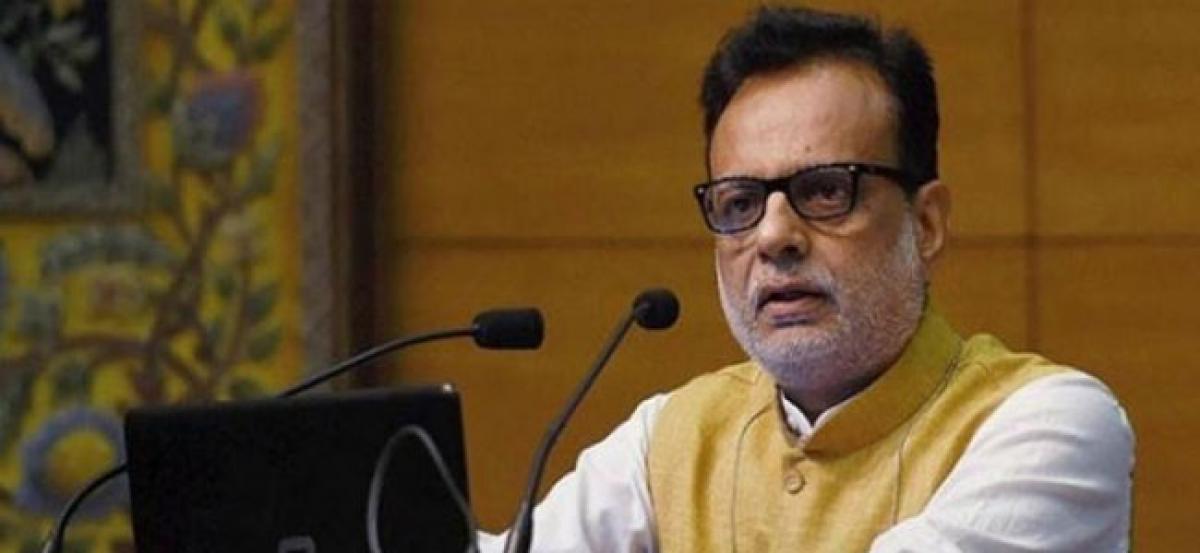Live
- SS Rajamouli Unveils India’s First Dolby Certified Postproduction Facility for Cinema & Home at Annapurna Studios
- Divi turns heads with a bold look
- Nikki Tamboli stuns in Dubai
- Amritha Aiyer and her sense of fashion
- Rowdy Sheeter Badruddin Arrested in Mangaluru Gun Firing Case
- Dressing up for the first Lohri: Ethnic looks That shine bright
- Nidhhi Agerwal receives threatening comments on SM, files cybercrime complaint
- Aishwarya Rajesh eyes career breakthrough with ‘Sankranthiki Vasthunnam’
- TTD Offers Special Darshan and Medical Support to Stampede Victims
- Blinkit Now Delivers Laptops, Monitors, and Printers in 10 Minutes
Just In
India an improbable democracy. Four factors to focus on for its growth


Prof Ashutosh Varshney of Brown University calls India an improbable democracy poor, impossibly heterogeneous and multicultural, and ironically, only its colonial heritage keeps it going
Prof. Ashutosh Varshney of Brown University calls India an improbable democracy — poor, impossibly heterogeneous and multicultural, and ironically, only its colonial heritage keeps it going.
There are only two ways of increasing growth. Increase investment or increase the efficiency with which capital is used. The latter is tough but critical. Efficiency and stability invite foreign capital in, build supply chains and boost “federated” exports as many economies get a say and a share in the final product. Making the world your shareholder makes politicians more responsible barring outliers like US President Donald Trump and who knows, his unorthodox might well work for the United States.
India is hugely capital starved. Unfortunately, it has not done well either in using capital efficiently. And it is not just the public sector alone which is wasteful. A generalised trend of wastefulness springs from poor monitoring systems available to the government, shareholders and citizens, none of which can easily check the data by triangulating information sources. Bengaluru airport has had charging points in its parking lot since 2008 for electric cars, which will not use them till 2030. You pay for casually over designed projects. The building of Amravati, the new capital of Andhra Pradesh, represents all that is wrong with our democracy.
Finance secretary Hasmukh Adhia has admitted that the GST network has failed to provide end-to-end digitisation. We knew this. But speaking honestly and responsibly endeared him to the public. Sadly, no one is to be held accountable for this glitch.
Wasteful use of capital is hardwired into a system which prices capital cheaply. Most business folk will moan about the high cost of funds in India. But the fortunes, domestic and overseas troves of real estate barons and industrial tycoons were built on negative interest rates, with inflation boosting prices but diluting the real interest cost of a bank loan to zero over a 10-year period.
First, the new national government, later this year or in early 2019, must tackle the long-ignored task of public sector reform. It is shocking that economic duality has widened since 1947. The average citizen and business is streets ahead of the government in the effective use of 21st century technology to make employees accountable.
Second, know your citizens. Make all residents and citizens identifiable, traceable and accessible. Aadhaar is the answer. Make registration for Aadhaar painless and self-declaratory for the ability to cancel out duplicates is supposed to be built into the system to enhance its accuracy in identification; mask the private information better and multiply improved digital recognition equipment. Populate data for citizenship, electoral rights and public benefits, using Aadhaar as the base platform. Transfer all public benefits through bank accounts. Roster all government officials, below 40 years of age, irrespective of grade or cadre, to serve as field-level facilitators wherever they are posted, with specific mentoring targets, to help citizens access their benefits.
Third, change public incentives and processes. Switch from lazy budgeting of inputs to specific outputs, achievable over two years and outcomes over five years. Form teams of specifically identified officials to programmes and projects; ensure that there are no transfers and the team remains intact for the next five to 10 years. This will ensure more responsible budgeting; development of job commitment and expertise and improve outcomes. China does not shift from its officials about needlessly. They stay tied to specific tasks for long periods as many forever. We encourage our officials to forum-shop from one cushy position to another.
Fourth, walk the talk. Withdraw the government from being a market participant and it will work better. Markets are like forests. Naturalists like Pradeep Krishen say it is enough to fence barren land off from predators like goats to allow a forest to regenerate. Going with the grain of nature doubles results. Anything else is wasteful and inefficient.
Democracy is not the reason for our woes. It is what we do with it that’s troubling. Democracy implies at least a 50 percent chance of not getting re-elected.

© 2025 Hyderabad Media House Limited/The Hans India. All rights reserved. Powered by hocalwire.com






